Discover the secret to healthy, vibrant hair with grapeseed oil. This blog explores many benefits of grapeseed oil and explains why it could be the missing ingredient in your hair care routine.
Rich in nutrients and antioxidants, grapeseed oil can combat dryness, reduce frizz, and promote overall hair health.
If you’ve been wondering, “Is grapeseed oil good for hair?” you’ll find all the answers here. Keep reading to unlock the potential of this lightweight, versatile oil and transform your hair.
Is Grapeseed Oil Good For Hair?
Grapeseed oil isn’t just great for cooking; it’s also excellent for your hair. Cosmetic chemist Manuela Marcheggiani explains, “Grapeseed oil is a lightweight, fast-absorbing oil made from the seeds of grapes, usually after wine is made. It’s rich in healthy fats, especially linoleic acid, as well as vitamin E, plant compounds, and other antioxidants.”
Marcheggiani highlights the benefits, saying, “Linoleic acid helps keep the skin’s barrier strong, which supports hydration and makes the skin look smoother, while vitamin E is a powerful antioxidant that protects the skin and hair from environmental damage.
The plant compounds in grapeseed oil also have anti-inflammatory properties, making it great for soothing irritated skin and scalp.
Notes:
- Application Tips: Apply grapeseed oil directly to your scalp and hair, leave it on for 20-30 minutes, then wash it out with shampoo. This can help reduce dandruff and moisturize your hair.
- Combining with Other Oils: Mix grapeseed oil with other beneficial oils like coconut or jojoba oil for a better hair treatment.
- Scalp Massage: Regular scalp massages with grapeseed oil can improve blood circulation, promoting healthier hair growth.
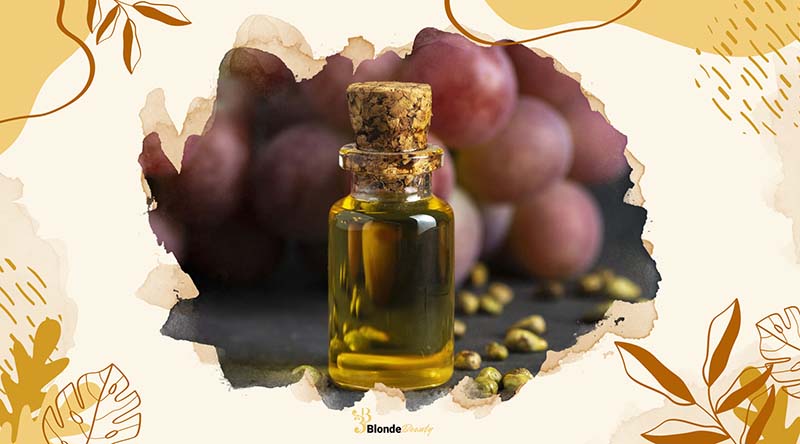
7 Benefits of Grapeseed Oil for Hair
Combatting Dandruff and Scalp Buildup
Grapeseed oil has anti-inflammatory properties that help reduce inflammation in the scalp, decreasing the chances of developing conditions like dandruff or scalp psoriasis.
The oil can inhibit excess sebum production, helping to reduce oily scalp and dandruff. By soothing the scalp, grapeseed oil can also help reduce flaky skin and buildup.
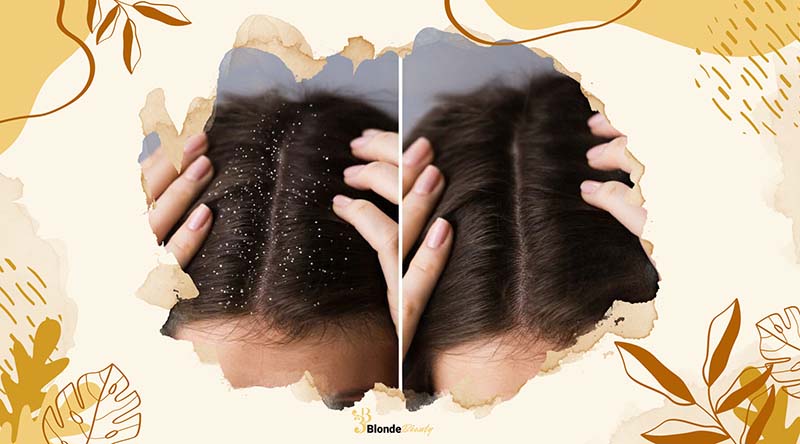
Stimulating Hair Growth
Grapeseed oil can promote hair growth due to its high content of flavonoids, vitamin E, and linoleic acid. These components nourish the scalp and hair follicles, encouraging increased hair length and thickness.
The essential fatty acids, antioxidants, and vitamins in grapeseed oil improve scalp health, creating an optimal environment for new hair growth.
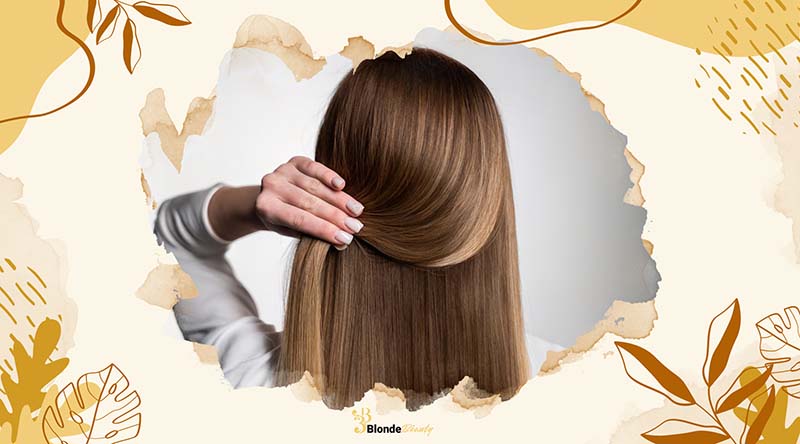
Reinforcing Hair Roots
Grapeseed oil can deeply condition the hair shaft, fortifying each strand from within. This strengthening effect on the hair roots makes hair more resilient against breakage and daily wear and tear. Regular use can lead to healthier, stronger hair.
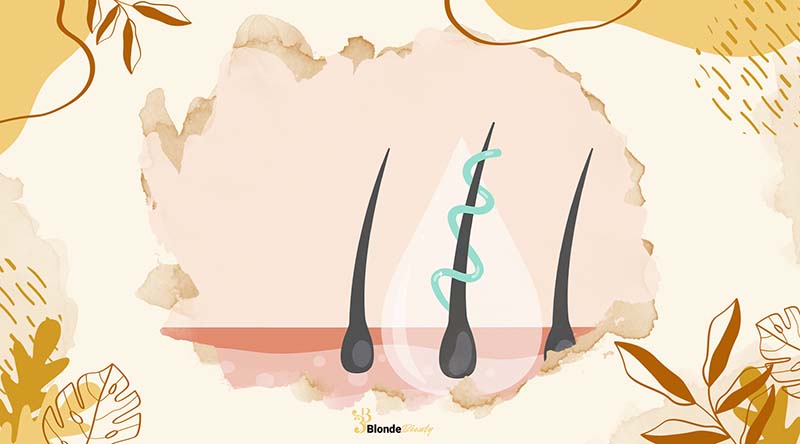
Enhancing Blood Circulation
Massaging grapeseed oil into your scalp can boost blood circulation. This helps hair growth by delivering more nutrients and oxygen to the hair follicles. Better blood flow to the scalp keeps hair roots healthy, promoting growth and preventing hair loss.
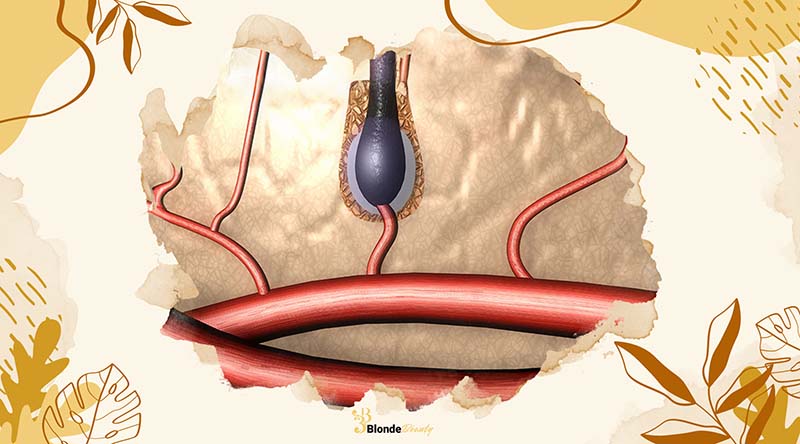
Locking in Moisture and Minimizing Frizz
One of the significant benefits of grapeseed oil is its ability to lock moisture into the hair shaft. This helps reduce dryness and frizz, making hair smoother and more manageable.
Adding a few drops of grapeseed oil to your hair can keep your tresses smooth, shiny, and well-hydrated. Its lightweight nature means it won’t weigh your hair down.
Enhancing Shine and Radiance
Grapeseed oil acts as a natural hair conditioner, giving your hair a healthy shine and vibrancy without leaving it greasy or heavy. Its light texture makes it ideal for daily use.
Applying 2-3 drops of grapeseed oil directly to damp hair after showering can serve as an excellent shine and moisture booster, enhancing the overall appearance of your hair.
Protecting Against Environmental Damage
The antioxidants and fatty acids in grapeseed oil help protect your hair from damaging elements like pollution, heat, and UV radiation. These protective qualities can reduce hair damage caused by environmental stressors, helping your hair stay strong and healthy. Incorporating grapeseed oil into your hair care routine can provide a shield against these harmful factors, maintaining your hair’s health and vitality.
Does Grapeseed Oil Pose Any Risks?
While grapeseed oil has many benefits, it can also cause some side effects. Here are a few potential risks:
Headaches
Using grapeseed oil on your hair and scalp can sometimes cause headaches. This may be due to sensitivity to the oil or its components.
Dizziness and Nausea
Some people may experience dizziness and nausea when using grapeseed oil. These symptoms are rare but can occur, especially if you have a sensitivity to the oil.
Allergic Reactions
If you are allergic to grapes, grapeseed oil can cause allergic reactions such as redness, itchiness, or a rash on your skin. It is important to do a patch test before using the oil extensively.
Skin Irritation
Grapeseed oil can cause irritation when applied to chapped skin or open wounds. It may worsen the condition by irritating the already sensitive area.
Notes:
- Patch Test: Always perform a patch test before using grapeseed oil on your skin or scalp. Apply a small amount to a small area of your skin and wait 24 hours to see if any reaction occurs.
- Consultation: If you have sensitive skin or known allergies, consult with a healthcare professional before using grapeseed oil.
How to Use Grapeseed Oil for Hair?
Grapeseed oil is readily available online and in grocery stores. If you’re interested in adding grapeseed oil to your hair-care routine, experiment with it to find what works best for your hair and fits into your existing routine. Check out these suggestions:
As a Leave-In Treatment
Once or twice a week, apply a few drops of grapeseed oil to your hair and/or scalp. Leave it on for 20-30 minutes, then wash your hair as usual. This can help with hydration and scalp health.
For a Moisturizing Boost on Wash Day
Mix a small amount of grapeseed oil with your shampoo or conditioner when washing your hair. This can provide an additional moisturizing boost, making your hair softer and more manageable.
For Styling
If you’re prone to dryness and frizz, apply a few drops of grapeseed oil to the lengths of your hair after showering. This can help reduce frizz and improve moisture retention, leaving your hair smoother and shinier.
Notes:
- Consistency: Consistent use will yield the best results, so incorporate it into your routine regularly.
- Moderation: Use grapeseed oil in moderation, especially if you are new to it, to avoid any adverse reactions.

Conclusion
Grapeseed oil is a versatile and beneficial addition to any hair care routine. Whether you’re looking to combat dandruff, promote hair growth, enhance shine, or protect your hair from environmental stressors, this lightweight oil offers numerous advantages. Try experimenting with grapeseed oil to find the best way to incorporate it into your routine and witness its transformative effects on your hair.
We’d love to hear about your experiences with grapeseed oil for hair. Share your stories and tips in the comments below! For more great hair care advice and tips, be sure to check out more blogs from BlondeBeauty. Stay beautiful and keep shining.

Laureate Professor Clare Collins
Professor Clare Collins is a leading expert in nutrition and dietetics at the School of Health Sciences, part of the College of Health, Medicine and Wellbeing. Her work is changing the way we think about food and health. She grew up as one of nine children and was the first in her family to finish high school and go to college. This background gave her a strong work ethic and a deep appreciation for seizing opportunities.
As the Director of the Hunter Medical Research Institute’s Food and Nutrition Program and a recipient of three NHMRC Research Fellowships, Professor Collins is making a big difference in public health. She focuses on helping people who are often overlooked, using new technologies like apps and online programs to improve their nutrition and reduce the risk of chronic diseases.
Professor Collins is well-respected and has been recognized as a Fellow in four major health and science organizations. She leads a diverse team of experts, including dietitians, computer scientists, and engineers, working together on global health projects.
Her achievements are impressive. She has received over $29 million in research funding, published more than 450 papers, and helped 35 PhD and Master’s students complete their degrees. She’s also active in sharing her knowledge with the public. She has developed tools like the Australian Eating Survey and the Healthy Eating Quiz, and she often appears in the media to talk about nutrition.
PUBLISHED ARTICLES
- Collins, C. (2019). “The Effect of a Pilot Dietary Intervention on Pain Outcomes in Patients Attending a Tertiary Pain Service.”
- Collins, C. (2022). “Variation in cardiovascular disease risk factors among older adults.”
- Collins, C. (2022). “Evaluation of an online intervention for improving stroke survivors’ health-related quality of life: A randomised controlled trial.”
These articles show Professor Collins’s commitment to understanding how better nutrition can improve health. Her work is important for researchers, doctors, and anyone interested in healthy living.
